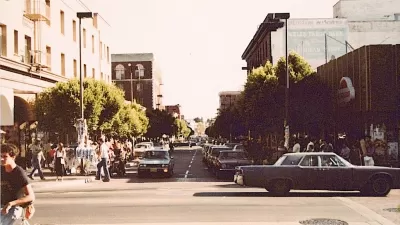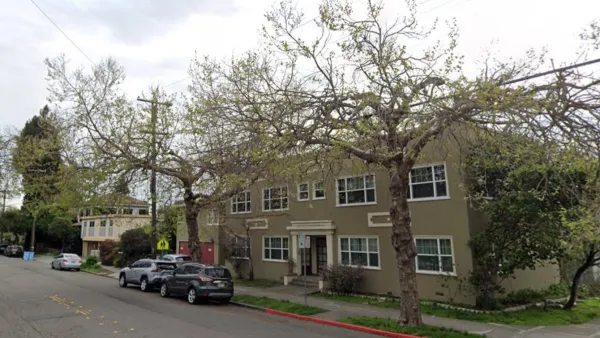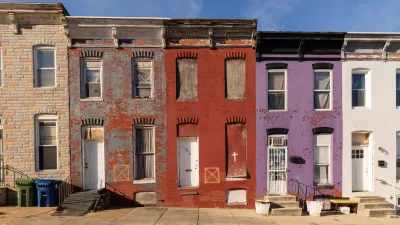Soumya Karlamangla profiles a once-thriving hippie mecca, hit by hard times and largely abandoned, even by the nearby student population. Is it down for the count?

Even before last year's fire, things on Telegraph were a shadow of what they had been in its glory days. But when a blaze on the main drag of Berkeley, California consumed a 39-unit apartment building and the restaurants below, it sent a shockwave through the neighborhood from which it's still waiting to recover.
"The idea that the neighborhood was closed down permeated out into the rest of the area," said Doris Moskowitz, second-generation owner of nearby Moe's Books, "and we're really not seeing foot traffic come back." Moskowitz was forced to lay off three employees in the slump following the disaster.
Both officials and business owners throughout the city have tried to revitalize the area economically without compromising its hippie character, but, as Karlamangla explains, "The effort has largely failed - since 1990, sales on Telegraph have declined more than 40 percent," according to Dave Fogarty, the city's economic development project coordinator. While some landowners and community members are eager to rebuild vacant lots, and the city council has even offered to waive some development mitigation fees, other developers and officials have entangled themselves in legnth court battles, "each accusing the other of failing to live up to promises."
Karlamangla points to the disconnect between the 60s college-town environment and changing consumer preferences: "Students may walk up Telegraph to get to class, but they prefer to shop in San Francisco or Emeryville, according to a survey conducted last year by UC Berkeley's student government. From Telegraph, they want to see more restaurants and nightlife; anchor stores such as Moe's Books and Amoeba Records carry items they've become accustomed to buying online."
"People who remember Telegraph from their younger days, said Moskowitz, 'come here ... and it breaks their heart, because they see addiction and they see misery and they don't want to come back. I don't know if Telegraph is meaningful to people anymore, or if it just makes them sad.'"
FULL STORY: Fire accelerated Telegraph Avenue spiral

Maui's Vacation Rental Debate Turns Ugly
Verbal attacks, misinformation campaigns and fistfights plague a high-stakes debate to convert thousands of vacation rentals into long-term housing.

Planetizen Federal Action Tracker
A weekly monitor of how Trump’s orders and actions are impacting planners and planning in America.

In Urban Planning, AI Prompting Could be the New Design Thinking
Creativity has long been key to great urban design. What if we see AI as our new creative partner?

King County Supportive Housing Program Offers Hope for Unhoused Residents
The county is taking a ‘Housing First’ approach that prioritizes getting people into housing, then offering wraparound supportive services.

Researchers Use AI to Get Clearer Picture of US Housing
Analysts are using artificial intelligence to supercharge their research by allowing them to comb through data faster. Though these AI tools can be error prone, they save time and housing researchers are optimistic about the future.

Making Shared Micromobility More Inclusive
Cities and shared mobility system operators can do more to include people with disabilities in planning and operations, per a new report.
Urban Design for Planners 1: Software Tools
This six-course series explores essential urban design concepts using open source software and equips planners with the tools they need to participate fully in the urban design process.
Planning for Universal Design
Learn the tools for implementing Universal Design in planning regulations.
planning NEXT
Appalachian Highlands Housing Partners
Mpact (founded as Rail~Volution)
City of Camden Redevelopment Agency
City of Astoria
City of Portland
City of Laramie





























